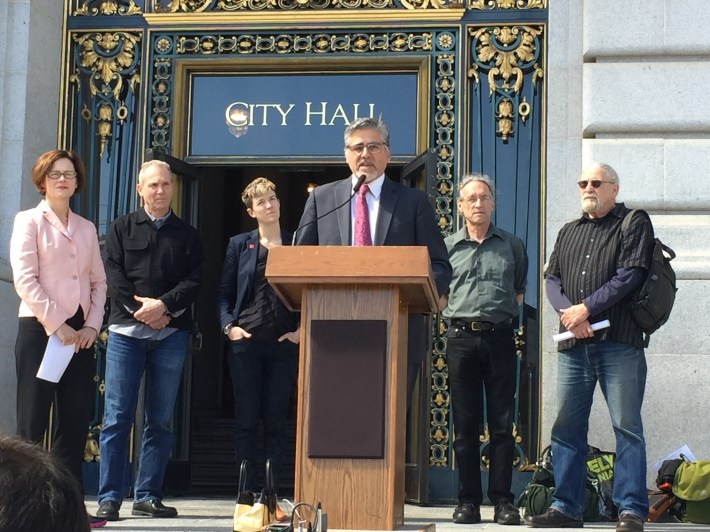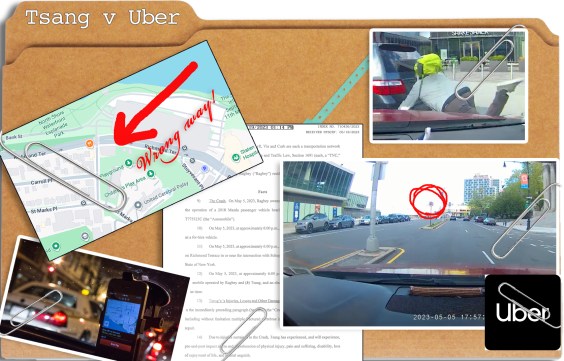
Supervisor John Avalos, backed by safe streets and transit advocates, and Supervisors David Campos and Jane Kim, made a push today to override Mayor Lee's veto of a proposed increase in the Transportation Sustainability Fee (TSF) on large commercial developments. But the override only got six votes rather than the eight required.
The proposal would have increased the one-time fee on large commercial projects by $2 from $19.04 to $21.04 per square foot (and that only applies on the portion above 100,000 square feet, if the project is large enough to qualify). It also requires commercial projects in the pipeline that have not received Planning Commission approval to pay half of the difference between the new TSF and the previous fee.
The TSF was a huge step forward, requiring developers to pay a fee for for impacts on transportation infrastructure brought about by the workers and residents they bring to the city. The proposed increase, meanwhile, would have generated an estimated $2.4 million a year along with $30 million in one-time revenue for the SFMTA.
“Mayor Lee’s veto of the TSF ordinance preserves a backroom deal with developers and forces tax payers, Muni riders, and workers to subsidize the increased transportation impacts of big developments,” said Supervisor John Avalos. "The SFMTA will be forced to make up for the gap in revenue through increased fares and fines or further defer much-needed maintenance and capital projects."
But, obviously, it wasn't just the mayor who was opposed to this particular increase, which only passed by a six-to-five vote in the first place. Supervisor Scott Wiener, whose pro-Muni cred is hard to question, voted against the increase and didn't pull any punches in a response to the override effort:
"The Avalos legislation--vetoed by Mayor Lee--is more about scoring political points than transportation policy or funding. The Avalos legislation produces very little ongoing revenue and undermines the collaborative work that led to the passage last year of the TSF."
But Wiener didn't stop there.
"The TSF legislation I authored and that we passed last year is highly impactful. It almost doubles the annual projected yield of transportation impact fees, from $26 million a year to $45 million. This nearly $20 million annual increase will allow us to significantly invest in Muni and street safety projects.
The Avalos legislation stands in stark contrast to the thoughtful, collaborative, and significant TSF legislation we passed last year. The Avalos legislation is minor in terms of the new funding it produces and constitutes bad faith in terms of the five-year legislative process we went through to pass the TSF. Compared to the nearly $20 million in additional funding annually that our TSF legislation will produce, this new legislation provides a mere $2.5 million in new ongoing annual funding."
But if Avalos is grand standing, he is doing it alongside some potent allies, including the San Francisco Transit Riders Union, the San Francisco Bicycle Coalition and others seen in the photograph from the press event above:
"As SFMTA works on its budget for the 2016-2018 fiscal period, it is painfully clear that the agency lacks both the operating and capital resources it needs, and programs are being deferred because of these shortages,” said Thea Selby, Chair of the San Francisco Transit Riders Union Executive Board. “These proposed boosts to the TSF would help keep Muni needs on track."
"Now is no time to stick our heads in the sand, in the face of an increasingly congested city," said Margaret McCarthy, interim executive director of the SF Bicycle Coalition, at the presser. "Now’s the time for investing in a future that leaves our city and our planet better off than how we inherited it."
But Wiener didn't hold back.
"The new legislation also sends a clear message to community stakeholders that if you participate in a lengthy and controversial legislative process and make concessions--in this case a significant increase in transit impact fees on commercial development and an extension of the fee, for the first time, to residential development--your reward will be passage of the negotiated legislation followed by an immediate breach of that negotiated resolution by increasing the fee even further."
Actually, Wiener's logic is similar to the Mayor's, who said this in his veto letter, from March 11:
"The TSP was developed over many years through an extensive public process, earning broad stakeholder support and creating $1.27 billion in revenue for San Francisco transportation infrastructure over the next 30 years. This process included a multitude of commissions and numerous hearings before the Board of Supervisors. I was proud to have signed the unanimously approved package just four months ago that levied TSF on residential development for the first time ever and increased the fees on commercial development as well. To re-open this issue would undermine the trust of impacted stakeholders and hinder our ability to create consensus in the future."
Selby, however, wasn't buying it:
"Mayor Lee rightly deserves credit for supporting the TSF as initially passed, expanding development fees to large residential developments. However, we should remember the TSF is a fee, not a tax. It seeks to recover a portion of the true transportation costs imposed on the City by new development—and only a share. Traditionally, the minimum share recovered by the TIDF which preceded the TSF was at least 25 percent of the costs estimated by a “nexus study.” The current TSF recovers the lowest percentage of the City’s estimated costs ever imposed by the fee. The proposed amendment, which would raise the fee by $2 per square foot, would only bring the fee close to, but still below, the 25 percent rate previously imposed."
Either way, getting enough support to override a veto for bicycling and transit is problematic, to say the least, especially with a proposal that passed by a narrow majority in the first place. "Supervisor Avalos and I work well together on a host of transportation issues," said Wiener, shortly before casting his "no" vote. "We just disagree on this one."
![Image via SF Planning presentation [PDF]](https://lede-admin.sf.streetsblog.org/wp-content/uploads/sites/47/2015/06/tspieces.jpg?w=710)





